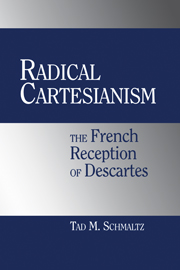Conclusion: “A Forgotten Branch of Cartesianism”
Published online by Cambridge University Press: 03 July 2009
Summary
Tels sont les cartésiens les plus remarquables de cette première période de l'histoire du cartésianisme. En général, ils se bornent à reproduire exactement la doctrine de Descartes ou, s'ils la modifient, c'est dans un sens empirique plutôt qu'idéaliste. Si quelques-uns sont les contemporains de Malebranche, tous lui sont antérieurs par leur développement philosophique et échappent à son influence.
Such are the most remarkable Cartesians of this first period of the history of Cartesianism. In general, they limit themselves to reproducing exactly the doctrine of Descartes or, if they modify it, it is in an empirical more than an idealistic direction. If some of them are contemporaries of Malebranche, all are prior to him in terms of their philosophical development and escape his influence.
– Francisque Bouillier, Histoire de la philosophie cartésienneIn these very brief concluding remarks, I will not attempt to summarize all the historical and conceptual points I have made concerning the Radical Cartesianism of Desgabets and Regis. Instead, I will draw on my discussion of these points to respond directly to the charge that there is no good reason to devote a book-length study to a school of thought that Charles de Kirwan dubbed – in a rarely cited article written nearly a century ago – “a forgotten branch of Cartesianism” (un rameau oublié du cartésianisme). As we will discover, remarks in Bouillier and Kirwan indicate competing ways in which this objection could be developed.
- Type
- Chapter
- Information
- Radical CartesianismThe French Reception of Descartes, pp. 261 - 266Publisher: Cambridge University PressPrint publication year: 2002



